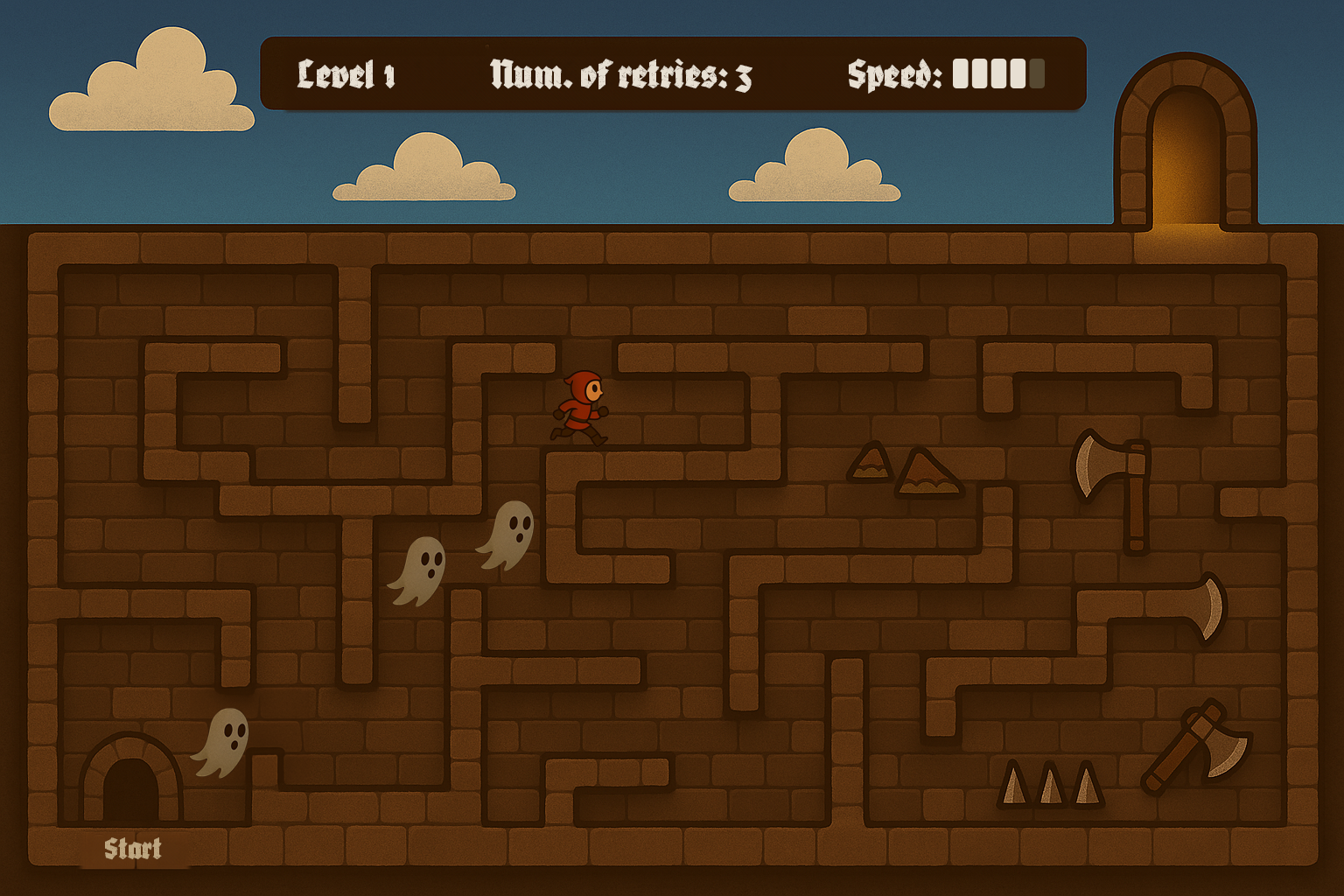forked from andrea/homework5
4.5 KiB
4.5 KiB
Ghost Chase
Name: Yewon Kim
Student ID: 20253158
Repository URL: http://git.prototyping.id/20253158/homework5
📑 Table of Contents
1. Game Concept & Mechanics
Ghost Chase is a multiplayer maze attack game where two players co-control a single character to escape the maze (dungeon).
“You’re not just escaping the maze. You’re escaping the traces of your past.”
🎯 Goal
- Solve the maze and reach the exit of the dungeon, avoiding obstacles.
- Avoid ghost clones that replay your previous failed attempts.
- Survive each level as new ghost clones stack up.
🕹️ Controls & Interactions
| Player | Controls | Role |
|---|---|---|
| 1 | A, W, D |
Controls direction |
| 2 | → to move, ↑/↓ to change speed ranging from 1~5 |
Controls movement and throttle |
Win Condition:
- Reach the exit before getting caught by any ghost.
Lose Condition:
- Hit an obstacle, or collide with a ghost (your past self).
2. Game Elements & Implementation
🌐 Game World
- Bottom-up maze with walls and traps, ending with an exit to outside.
- One player icon, followed by its ghost clones (# of retries).
- UI overlays (level, # of retries, speed of player).
- Concept diagram:

🖼️ Reference Images
-
Ghost Chase would resemble the logic and visuals of maze attack games like Pacman.


🔧 Architecture
📦 Tentative Folder Structure
ghost-chase/
├── public/
│ └── index.html
├── src/
│ ├── components/ # Svelte UI components
│ │ ├── Canvas.svelte # Imports game p5 sketch
│ │ └── HUD.svelte # Level info, retries, speed
│ ├── game/ # Game logic
│ │ ├── gameLoop.js # Initialize, update and render game
│ │ ├── player.js # Player input + drawing player sprite
│ │ ├── ghost.js # Ghost clone management + drawing ghost sprite
│ │ ├── maze.js # Maze structure + drawing
│ │ ├── controls.js # Key mappings
│ │ └── recorder.js # Records player path
│ ├── App.svelte # Roots Svelte components
│ ├── main.js
│ └── styles.css
├── package.json
├── vite.config.js
└── README.md
🧱 Modules and Libraries
- Each game module inside
/src/game/encapsulates a single responsibility so that logic stays separated from the UI. Canvas.svelteimports and orchestrates these modules through a p5 sketch loop (setup,draw), callinggameLoop.js, which delegates control to modules likeplayer.js,ghost.js, andmaze.js.- UI state (level, # of retries, speed of player) is exposed via reactive Svelte stores and displayed using
HUD.svelte. - Libraries used:
🌀 Recursive Function for Ghost Replay
To replay ghost movement, a recursive function steps through each stored frame:
function replayGhostPath(frameList):
if frameList is empty:
return
set ghost state to first frame
delay
call replayGhostPath with remaining frames
This allows ghost clones to:
- Move in sync with past runs
- Be layered recursively as the game progresses
- Operate independently from player logic using stored frame data
3. Expected Challenges
- Ghost logic: replaying previous frames accurately with recursive logic
- Collision and timing issues with multiple ghosts
- Handling performance/memory with repeated clone storage
- Keeping the gameplay balanced (not too easy or impossible after many retries)
- Syncing ghost position and player state updates cleanly in each frame